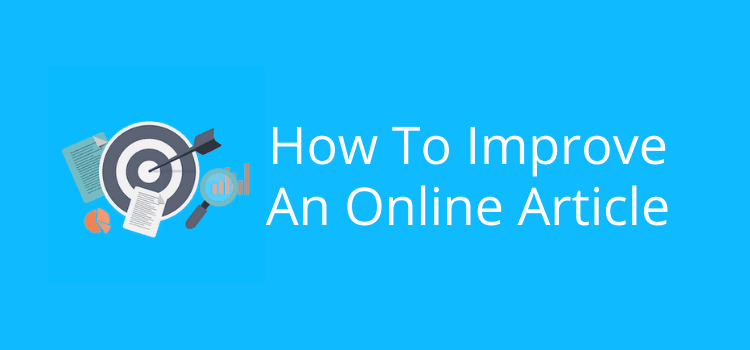
Algorithms are the invisible gatekeepers of information. Every second of every day, algorithms decide whose content and writing wins or loses.
For writers and authors, Google and Amazon are two crucial platforms. Both use complex programs to determine which content or books get seen and which don’t.
If you publish online content or books, a basic understanding of how these algorithms work is vital.
But because they are a closely guarded commercial secret, it’s not always easy to learn how they work.
How do algorithms work?
Algorithms are computer programs that rank content like blog posts, articles, and books.
They are incredibly complex. For example, Google’s search algorithm is estimated to contain over 2 billion lines of code.
But at a basic level, you could compare them to a simple spreadsheet.
Imagine you have ten items in a list with columns for price, size, unit sales, and gross margin.
A different item will go to the top if you sort this list by any of the four factors. However, the result can change again if you sort using two factors.
However, instead of only four factors, algorithms can sort and rank hundreds of factors in various ways.
Although some of these factors, or signals, are reasonably well established, most remain unknown or unclear.
For example, no one knows how Google or Amazon rank search results based on a user’s previous search activity.
Nor do we know what factors influence ranking variations from day to day or if content age is a factor.
The only way you can try to get a positive result is to stick to what we do know.
Google is the gatekeeper of visibility
When it comes to ranking online content, Google reigns supreme, with a market monopoly over online search.
Its algorithms compute many factors, including backlink quality, relevance, writing quality, and user engagement, to select which content earns a place on the first page of search results.
That’s not an easy task, with millions of pages of new content published every day.
The only way to compete is to optimize your online content as best you can with the resources you have.
Learning a little about SEO (search engine optimization) is the best way to help improve your chances of your articles, blog posts, or author blogs appearing in Google Search.
You can read thousands of articles on the topic, but the easiest way I find to optimize my articles is to use an SEO plugin.
All In One SEO and Yoast are the most popular.
I use Yoast because I find it easy to use, but perhaps also because I’m familiar with it.
But either tool will help you get the essential on-page factors right.
You can check that your title length is appropriate, that you are not overusing your keyword phrase, and that your meta description is suitable.
Other factors these tools check are readability, use of passive voice, and inclusion of headings and transition words.
They also check the number of internal and external links and image alt text.
You don’t have to get all green lights for every factor. But tools like these will help you get the most important things right.
With Google, many factors and signals that are out of your control. But at least with the help of a good SEO plugin, you can do your best with what you can control.
Amazon’s A9 algorithm is the judge and jury for books
Like Google, Amazon has a monopoly market share for books and ebooks.
Amazon’s A9 algorithm determines the visibility of books using factors such as sales history, customer reviews, and keyword relevance.
While some aspects are beyond an author’s control, there are approaches you can take to improve visibility on Amazon.
One top priority is selecting the best categories and search keywords for a book to help readers find it when using Amazon Search.
You can research the best choices using the search box on Amazon or dedicated software to access the data.
The most popular choice for authors is Publisher Rocket. With the software, you can drill down to categories and keywords that will give you the most exposure and, hopefully, sales.
Another vital element is your book description because it serves two purposes.
One is to convince a reader to buy your book, and the other is to help Amazon’s algorithm identify the main topics of your book. You can achieve this by including a few relevant keywords in your description.
Lastly, customer reviews are one of the most vital factors in Amazon’s algorithm. They are a vote of popularity, so work as hard as you can to get as many reviews as possible for your book.
How algorithms decide who wins

Amazon and Google algorithms are complex and expensive to run. Neither company uses them for the greater good or to help the world.
The principal purpose is to maximize profits.
For Google, it is the primary tool for elevating advertising revenue, while Amazon wants to promote the most profitable items from its inventory.
That’s not to say you can’t get your articles or books to rank reasonably well and be discovered online.
But you need to be realistic in your expectations. Ranking number one on Google or Amazon is extremely difficult.
However, you can help algorithms decide that your content or book is worthy of listing and indexing by optimizing it as best as possible.
But the two most challenging signals for writers and authors are backlinks for articles and customer reviews for books.
Both of these are strong signs of popularity for algorithms.
Gaining them is not easy, and increasing your backlinks or reviews requires a lot of time and hard work.
Conclusion
For any form of publishing, your online presence is vital to your chances of success.
It’s an ever-changing and evolving factor because competition increases every day.
And it’s not only algorithms that pose a challenge.
AI (artificial intelligence) and LLMs (large language models) are adding to the complexity at an incredible pace of development.
For a new writer or author, it can all seem daunting.
But you have a better chance of succeeding if you have a little understanding of how things work.
You can’t change the fact that algorithms decide whether your content, articles, or books are worthy of indexing.
But you can influence them by writing exceptionally well and ensuring that you give the right signals.
You can give these signals by optimizing your writing or book listings with sound SEO practices.
At least then, you have a chance that algorithms will work in your favor.
Related Reading: The Publish Button Is A Writer’s Most Powerful Tool



